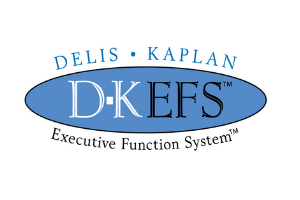Description
The Delis-Kaplan Executive Function System™ (D-KEFS™) is the first nationally standardized set of tests to evaluate higher level cognitive functions in both children and adults.

The Delis-Kaplan Executive Function System™ (D-KEFS™) is the first nationally standardized set of tests to evaluate higher level cognitive functions in both children and adults.
The Delis-Kaplan Executive Function System™ (D-KEFS™) is the first nationally standardized set of tests to evaluate higher level cognitive functions in both children and adults.
Dean C. Delis, Edith Kaplan, Joel H. Kramer
Overview:Assess key components of executive functions within verbal and spatial modalities
Age Range:Ages 8 through 89 years
RTI Tiers:RTI Levels 2 and 3
Completion Time:Variable depending on subtest selected: full battery 90 minutes
Norms:Normed on over 1,500 individuals demographically and regionally matched with the U.S. population
Publication Date:2001
The Delis-Kaplan Executive Function System (D-KEFS) is the first nationally standardized set of tests to evaluate higher level cognitive functions in both children and adults.
With nine stand-alone tests, comprehensively assess the key components of executive functions believed to be mediated primarily by the frontal lobe.
Its game-like format is engaging for examinees, encouraging optimal performance without providing “right/wrong” feedback that can create frustration in some children and adults.
D-KEFS offers two forms: Standard Record Forms include all nine D-KEFS tests, while the Alternate Record Forms include alternate versions of D-KEFS Sorting, Verbal Fluency, and 20 Questions Tests. An alternate set of Sorting Cards is also available.
D-KEFS is correlated with the CVLT®–II, providing information concerning the role of memory on D-KEFS performance.
An important study by Bohnen, Twijnstra, and Jolles (1992) was noted (p. 21) and referenced (p. 385) In the D-KEFS Examiner’s Manual (Delis, Kaplan, & Kramer, 2001). In this study, Bohnen et al. collected data from 10 patients (in the Netherlands) who had sustained mild TBIs with post-concussive symptoms that lasted longer than 3 months (the Persistent PCS group) and compared them to mild TBI patients who had recovered from their PCS symptoms after 3 months (the Recovered group). Bohnen et al. (1992) initially demonstrated that the Persistent PCS group performed significantly worse than the Recovered Group on a modified Stroop task that incorporated a switching procedure.
Dr. Manolo Sedo of Spain recently brought to our attention a second study by Bohnen, Jolles, and Twijnstra (1992), in which patients with acute mild TBI (6 to 14 days post injury) performed significantly worse than a match control group on the modified Stroop task that incorporated a switching procedure.
We wish to thank Dr. Sedo for drawing our attention to this important study.
Bohnen, N., Twijnstra, A., & Jolles, J. (1992). Performance in the Stroop color word test in relationship to the persistence of symptoms following mild head injury. Acta Neurologica Scandinavica, 85(2), 116–121.
Bohnen, N., Jolles, J., & Twijnstra, A. (1992). Modification of the Stroop color word test improves differentiation between patients with mild head injury and matched controls. The Clinical Neuropsychologist, 6(2), 178–184.
The D-KEFS Scoring Assistant®makes generating D-KEFS score reports faster and easier.
Use of installation discs is not recommended. An Internet connection will be needed to download updated software from pearsonassessmentsupport.com.
Presenter: Gloria Maccow, PhD

The Delis-Kaplan Executive Function System (D-KEFS) is a nationally standardized set of tests to evaluate higher level cognitive functions in children and adults. With nine stand-alone tests, clinicians can comprehensively assess the key components of executive functions believed to be mediated primarily by the frontal lobe. Clinicians can use the tests to determine how deficits in abstract, creative thinking may impact daily life, and to plan coping strategies and rehabilitation programs tailored to the client’s profile of executive-function strengths and weaknesses. During this hour-and-a-half long webinar, the presenter will describe administration, scoring, and basic interpretation of the D-KEFS tests.
Date: Oct 28, 2010